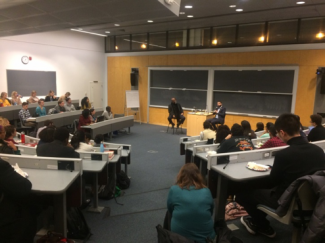Mayor Chokwe Antar Lumumba shares his people-centered approach to economic justice in Jackson, MS in candid conversation with Columbia Law School students
New York, March 22, 2018 — Chokwe Antar Lumumba, the youngest mayor in the history of Jackson, MS, spoke to an overflowing auditorium of Columbia Law students in February. “A radical is … a person who seeks change. If we look into our communities and see a need for change, we need to be prepared to be as radical as necessary,” he told the group.
Lumumba was elected on the promise that “when I become mayor, you become mayor.” He believes that each individual is an expert of their own condition so communities' voices are imperative to political processes and building a participatory democracy.
“First and foremost, the way in which we have pursued elections – by supporting individuals who express political ambition is a bit backwards. We find ourselves to be disappointed by the result, as opposed to creating the agenda and drafting the leadership that supports that agenda,” explained Lumumba. According to Lumumba, it is critical that residents understand the limitations of what can be obtained through traditional electoral politics, and that it is up to the people of the community to challenge the current system itself.

During the discussion, Lumumba shared the steps that he has taken as mayor of Jackson towards achieving a participatory democracy. This included making space for a “People’s Assembly,” where residents can provide feedback based on their lived experiences. The goal is for individuals to influence laws and policies so that they truly represent the needs of the people of Jackson.
One of the biggest struggles that Jackson faces, as the State’s capital, is retaining the wealth made there during the work day. Mayor Lumumba believes that the city of Jackson has not made the appropriate strategic investments to capture the wealth created within it. In response, Jackson is now building an infrastructure fund that will allow cooperative enterprises to come into being, as well as investing in a movie theatre complex. “If we don’t make the investment, we’ve seen the divestment,” he noted.

The talk was moderated by Columbia Law School Nash Professor Kendall Thomas and organized by Columbia Law School’s Human Rights Institute (HRI), Social Justice Initiatives, Black Law Students Association, Rightslink, and the Human Rights Law Review Journal, in addition to the African American Policy Forum. In her introductory remarks, JoAnn Kamuf Ward, Director of HRI’s Human Rights in the U.S. Project, noted that “[The Institute’s] efforts to ‘bring human rights home’ are based on a common belief that universal human rights values… provide an important touchstone for policymaking at the federal, state, and local level,” adding that the event epitomizes connections between human rights, social justice, and the work of elected officials, and mayors in particular.
# # #
The Human Rights Institute advances international human rights through education, advocacy, fact-finding, research, scholarship, and critical reflection. It works in partnership with advocates, communities, and organizations pushing for social change to develop and strengthen the human rights legal framework and mechanisms, promote justice and accountability for human rights violations, and build and amplify collective power.
Founded in 1998 by the late Professor Louis Henkin as the anchor for human rights within Columbia Law School, the Human Rights Institute promotes engagement and knowledge of human rights within the law school, throughout the University, and around world. Across the many substantive areas of its work, the Institute builds bridges between scholarship and activism, develops capacity within the legal community, engages governments, and models new strategies for progress.
